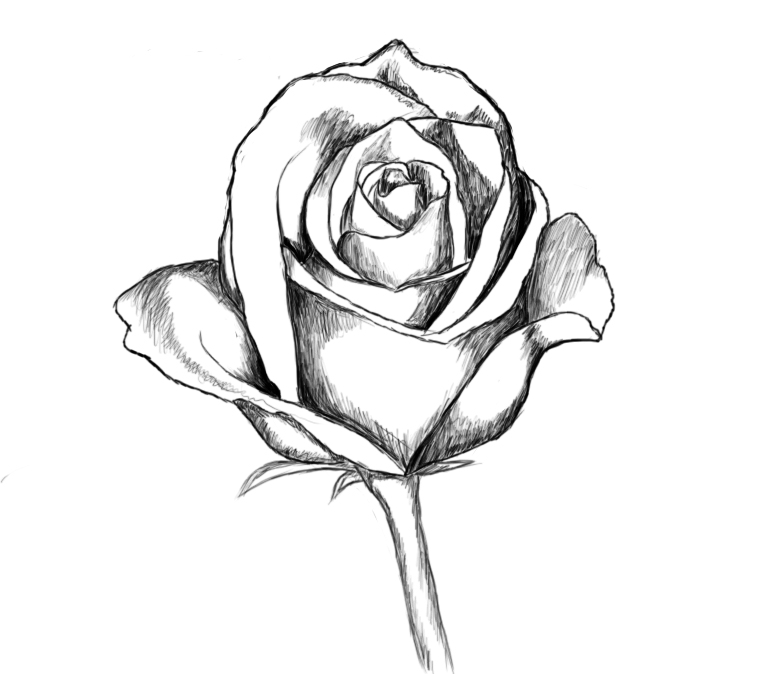Mastering The Art Of Drawing A Rose: A Step-by-Step Guide
Have you ever marveled at the beauty of a rose and wished to capture its elegance on paper? Drawing a rose can be a fulfilling and artistic endeavor that allows you to express your creativity. Whether you're a beginner or an experienced artist, knowing how to draw a rose can enhance your drawing skills and bring joy to your artistic journey. In this guide, we will explore the essential techniques and tips for drawing a rose that looks stunning and lifelike. Grab your sketchbook and pencil as we dive into the world of rose drawings!
Roses symbolize love and beauty, making them a popular subject for artists around the world. By learning how to draw a rose, you can not only improve your drawing abilities but also create personalized gifts for loved ones or beautiful decorations for your home. This article will walk you through the process of drawing a rose step by step, ensuring that you can create a piece of art that you will be proud of.
As we explore the various stages of drawing a rose, we will answer some common questions and provide helpful tips that will enhance your drawing skills. Whether you want to create a realistic depiction or a stylized version, this guide will cater to your artistic needs. So, let's get started on this artistic adventure and discover how to draw a rose!
What Materials Do You Need to Draw a Rose?
Before you begin the process of drawing a rose, it's important to gather the right materials. Having the right tools will make your drawing experience more enjoyable and productive. Here’s a list of materials you might want to consider:
- Sketchbook or drawing paper
- Pencils (HB, 2B, 4B for shading)
- Eraser
- Sharpener
- Colored pencils or markers (optional)
- Reference images of roses
How Do You Start Drawing a Rose?
The first step in learning how to draw a rose is to create a basic outline. This outline will serve as the foundation for your drawing. Here’s how to get started:
1. Sketch the Basic Shape
Begin by drawing a small circle in the center of your paper. This circle will represent the innermost part of the rose, where the petals will converge. Next, draw a larger oval around the circle to outline the overall shape of the rose.
2. Add Petals
Now it’s time to add the petals. Start by drawing curved lines that radiate from the small circle outward, following the oval shape. Keep the lines soft and flowing to mimic the natural curves of rose petals. Remember, roses have layers of petals that overlap, so don’t be afraid to draw multiple lines to create depth.
What Techniques Can You Use to Shade Your Rose Drawing?
Shading is an essential technique that can bring your rose drawing to life. Here are some effective shading techniques to consider:
1. Hatching and Cross-Hatching
Hatching involves drawing parallel lines in one direction, while cross-hatching involves overlapping lines in different directions. Use these techniques to create shadows and highlights in your rose petals.
2. Blending
To achieve a smooth transition between light and dark areas, use a blending stump or your finger to gently smudge the pencil marks. This will give your rose a soft, realistic appearance.
How Can You Add Color to Your Rose Drawing?
If you want to take your rose drawing to the next level, consider adding color. Here’s a simple approach:
1. Choose Your Colors
Roses come in various shades, from classic red to soft pinks and yellows. Choose the colors that resonate with you and your artistic vision.
2. Layering Colors
Start by applying a light base layer of color, then gradually build up darker shades in the areas that need more depth. Layering colors will create a more vibrant and dynamic look.
What are Common Mistakes to Avoid When Drawing a Rose?
Even experienced artists can make mistakes when drawing roses. Here are some common pitfalls to avoid:
- Ignoring proportions: Ensure that the petals are proportionate to the center of the rose.
- Overworking the lines: Try to keep your lines clean and avoid excessive erasing.
- Neglecting shading: Proper shading is crucial for creating depth and realism.
How Can You Practice Drawing Roses Effectively?
Practice is key when it comes to honing your drawing skills. Here are some effective ways to practice:
1. Draw from Reference
Use reference images of roses to guide your drawing. Pay attention to the shapes, colors, and details of the petals and leaves.
2. Experiment with Styles
Don’t be afraid to try different styles, such as realistic, abstract, or cartoonish roses. Experimenting will help you find your unique artistic voice.
Conclusion: Why is Drawing Roses Important for Artists?
In conclusion, learning how to draw a rose is not only a delightful artistic endeavor but also an important skill for any aspiring artist. Mastering the techniques of sketching, shading, and coloring roses can enhance your overall drawing abilities and allow you to express emotions through your artwork. So, whether you are creating gifts for loved ones or simply enjoying the process of drawing, the rose is a timeless subject that will always inspire creativity.
Now that you have the knowledge and tips on how to draw a rose, it’s time to put pencil to paper and start your artistic journey. Happy drawing!
Article Recommendations
- Luke Beasley Biography
- Munir Uwaydah
- Alex Lagina And Miriam Amirault Wedding
- Amanda Freitag Relationship
- Socialmediahot22_0.xml
- Wolf Cut Short Hair
- Papoose New Girlfriend
- Rodene Ronquillo
- Levotiroxina Para Que Sirve
- Music Matters



